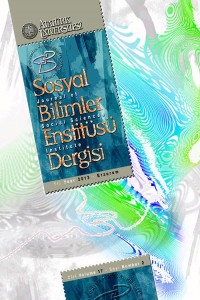Abstract
The dazzling pace of scientific and technological developments has made human beings subject to many problems such as nuclear hazard and environmental problems and resulted in a loss of his ontological meaning and value, and also led him to question whether science and technology had two opposite faces because the above mentioned developments failed to make human beings more humane, more civilized and happier; human beings could not achieve a life standard in line with his value and meaning; and human and nature have been destroyed by human himself. This study, pointing to the human-being responsibility of human as the producer and driver of scientific and technological developments, underlines the necessity and need to make scientific and technological developments in conformity with human values and social goals and to act in accordance with ethic conscience
References
- Aydın, M. (1992). “Manevi Değerler, Ahlak ve Bilim”. Felsefe Dünyası, 6, 23-28.
- Belge, M. (1995). “Soğuk Savaş Sonrası Çatışmalar”. Cogito, 3, 43-54.
- Bursalı, O. (1995). “Yeni Dünya Düzeni, Bilim ve Savaş”. Cogito, 3, 71-77.
- Cevizci, A. (2001). 17.y.y. Felsefesi Tarihi. Bursa: Asa Yayınları.
- Çüçen, A.K. (1997). Heidegger’de Varlık ve Zaman. Bursa: Asa Yayınları.
- Delice, E. (1999). “Savaşın Dialektik Süreci”. Felsefelogos, 8, 100-118.
- Erkan, H. (1993). Bilgi Toplumu ve Ekonomik Gelişme. Ankara: Türkiye İş Bankası Kül- tür Yayınları.
- Gökberk, M. (1966). Felsefe Tarihi. İstanbul: Remzi Kitabevi.
- Gürsoy, K. (1989). “İnsanı Anlamak Açısından Felsefe ve Beşeri İlimler”. I. Felsefe ve Sosyal İlimler Kongresi, 7-11 Mayıs 1984. Atatürk Üniversitesi, Erzurum.
- Gürsoy, K. (2007). Bir Evrensel Projemiz Var mı? İstanbul: Etkileşim Yayınları.
- Kant, I. (1984). Seçilmiş Yazılar, Sürekli (Ebedi) Barış Üstüne Felsefi Bir Deneme. Çev. Nejat Bozkurt, İstanbul: Remzi Kitabevi.
- Kant, I. (2002). Ahlak Metafiziğinin Temellendirilmesi. (Çev. I. Kuçuradi), Ankara:Tür- kiye Felsefe Kurumu Yay.
- Marcel, G. (1952) Man Against Mass Society. (Tr. G. S. Fraser). Chicago: Henry Regnery Co.
- Marcel, G. (1967). The Philosophy of Existentialism. (Tr. Manya Harari). New York: The Citadel Press.
- Marcel, G. (1973). Tragic Wisdom and Beyond (Including Conversations between Paul Ricoeur And Gabriel Marcel). (Tr. Stephen Jolin and Peter McCormick), Evanston: NorthWestern University Press.
- Sartre, J. P. (1985). Varoluşçuluk. (Çev. Asım Bezirci), İstanbul: Say Yayınları.
- Özkalp, E. (2008). Sosyolojiye Giriş. Bursa: Ekin Yayınları.
- Özlem, D. (2008). Felsefe ve Doğa Bilimleri. Ankara: Doğu Batı Yayınları.
- Topdemir, H.G. (1997). “Galileo ve Modern Mekaniğin Doğuşu”. Felsefe Dünyası, 24, 42-52.
- West, D. (1998). Kıta Avrupası Felsefesine Giriş. (Çev. Ahmet Cevizci), İstanbul: Para- digma Yayınları.
- Yıldırım, C. (1992). Bilim Tarihi. İstanbul: Remzi Kitabevi.
- Yıldırım, C. (2004). Bilim Felsefesi. İstanbul: Remzi Kitabevi.
Bilim ve Teknoloji Çağında İnsan Olma Sorumluluğu (Etik Bilinç) / Human-Being Responsibilty (Ethic Conscience) in the Era of Science and Technology
Abstract
References
- Aydın, M. (1992). “Manevi Değerler, Ahlak ve Bilim”. Felsefe Dünyası, 6, 23-28.
- Belge, M. (1995). “Soğuk Savaş Sonrası Çatışmalar”. Cogito, 3, 43-54.
- Bursalı, O. (1995). “Yeni Dünya Düzeni, Bilim ve Savaş”. Cogito, 3, 71-77.
- Cevizci, A. (2001). 17.y.y. Felsefesi Tarihi. Bursa: Asa Yayınları.
- Çüçen, A.K. (1997). Heidegger’de Varlık ve Zaman. Bursa: Asa Yayınları.
- Delice, E. (1999). “Savaşın Dialektik Süreci”. Felsefelogos, 8, 100-118.
- Erkan, H. (1993). Bilgi Toplumu ve Ekonomik Gelişme. Ankara: Türkiye İş Bankası Kül- tür Yayınları.
- Gökberk, M. (1966). Felsefe Tarihi. İstanbul: Remzi Kitabevi.
- Gürsoy, K. (1989). “İnsanı Anlamak Açısından Felsefe ve Beşeri İlimler”. I. Felsefe ve Sosyal İlimler Kongresi, 7-11 Mayıs 1984. Atatürk Üniversitesi, Erzurum.
- Gürsoy, K. (2007). Bir Evrensel Projemiz Var mı? İstanbul: Etkileşim Yayınları.
- Kant, I. (1984). Seçilmiş Yazılar, Sürekli (Ebedi) Barış Üstüne Felsefi Bir Deneme. Çev. Nejat Bozkurt, İstanbul: Remzi Kitabevi.
- Kant, I. (2002). Ahlak Metafiziğinin Temellendirilmesi. (Çev. I. Kuçuradi), Ankara:Tür- kiye Felsefe Kurumu Yay.
- Marcel, G. (1952) Man Against Mass Society. (Tr. G. S. Fraser). Chicago: Henry Regnery Co.
- Marcel, G. (1967). The Philosophy of Existentialism. (Tr. Manya Harari). New York: The Citadel Press.
- Marcel, G. (1973). Tragic Wisdom and Beyond (Including Conversations between Paul Ricoeur And Gabriel Marcel). (Tr. Stephen Jolin and Peter McCormick), Evanston: NorthWestern University Press.
- Sartre, J. P. (1985). Varoluşçuluk. (Çev. Asım Bezirci), İstanbul: Say Yayınları.
- Özkalp, E. (2008). Sosyolojiye Giriş. Bursa: Ekin Yayınları.
- Özlem, D. (2008). Felsefe ve Doğa Bilimleri. Ankara: Doğu Batı Yayınları.
- Topdemir, H.G. (1997). “Galileo ve Modern Mekaniğin Doğuşu”. Felsefe Dünyası, 24, 42-52.
- West, D. (1998). Kıta Avrupası Felsefesine Giriş. (Çev. Ahmet Cevizci), İstanbul: Para- digma Yayınları.
- Yıldırım, C. (1992). Bilim Tarihi. İstanbul: Remzi Kitabevi.
- Yıldırım, C. (2004). Bilim Felsefesi. İstanbul: Remzi Kitabevi.
Details
| Primary Language | tr;en |
|---|---|
| Authors | |
| Publication Date | January 3, 2014 |
| Published in Issue | Year 2013 Volume: 17 Issue: 2 |

